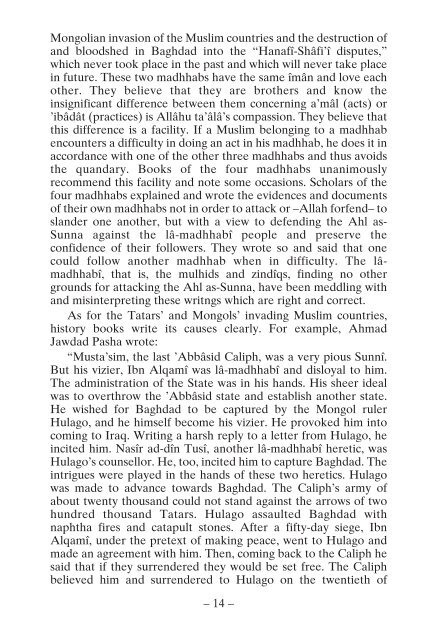Answer to an Enemy of Islam
Answer to an Enemy of Islam This is a refutation of the lies and slanders which the lâ-madhhabî Rashîd Rıdâ of Egypt, who appeared in the disguise of a religious man and wrote against the scholars of Islam in his book Muhâwarât.
Answer to an Enemy of Islam
This is a refutation of the lies and slanders which the lâ-madhhabî Rashîd Rıdâ of Egypt, who appeared in the disguise of a religious man and wrote against the scholars of Islam in his book Muhâwarât.
You also want an ePaper? Increase the reach of your titles
YUMPU automatically turns print PDFs into web optimized ePapers that Google loves.
Mongoli<strong>an</strong> invasion <strong>of</strong> the Muslim countries <strong>an</strong>d the destruction <strong>of</strong><br />
<strong>an</strong>d bloodshed in Baghdad in<strong>to</strong> the “H<strong>an</strong>afî-Shâfi’î disputes,”<br />
which never <strong>to</strong>ok place in the past <strong>an</strong>d which will never take place<br />
in future. These two madhhabs have the same îmân <strong>an</strong>d love each<br />
other. They believe that they are brothers <strong>an</strong>d know the<br />
insignific<strong>an</strong>t difference between them concerning a’mâl (acts) or<br />
’ibâdât (practices) is Allâhu ta’âlâ’s compassion. They believe that<br />
this difference is a facility. If a Muslim belonging <strong>to</strong> a madhhab<br />
encounters a difficulty in doing <strong>an</strong> act in his madhhab, he does it in<br />
accord<strong>an</strong>ce with one <strong>of</strong> the other three madhhabs <strong>an</strong>d thus avoids<br />
the qu<strong>an</strong>dary. Books <strong>of</strong> the four madhhabs un<strong>an</strong>imously<br />
recommend this facility <strong>an</strong>d note some occasions. Scholars <strong>of</strong> the<br />
four madhhabs explained <strong>an</strong>d wrote the evidences <strong>an</strong>d documents<br />
<strong>of</strong> their own madhhabs not in order <strong>to</strong> attack or –Allah forfend– <strong>to</strong><br />
sl<strong>an</strong>der one <strong>an</strong>other, but with a view <strong>to</strong> defending the Ahl as-<br />
Sunna against the lâ-madhhabî people <strong>an</strong>d preserve the<br />
confidence <strong>of</strong> their followers. They wrote so <strong>an</strong>d said that one<br />
could follow <strong>an</strong>other madhhab when in difficulty. The lâmadhhabî,<br />
that is, the mulhids <strong>an</strong>d zindîqs, finding no other<br />
grounds for attacking the Ahl as-Sunna, have been meddling with<br />
<strong>an</strong>d misinterpreting these writngs which are right <strong>an</strong>d correct.<br />
As for the Tatars’ <strong>an</strong>d Mongols’ invading Muslim countries,<br />
his<strong>to</strong>ry books write its causes clearly. For example, Ahmad<br />
Jawdad Pasha wrote:<br />
“Musta’sim, the last ’Abbâsid Caliph, was a very pious Sunnî.<br />
But his vizier, Ibn Alqamî was lâ-madhhabî <strong>an</strong>d disloyal <strong>to</strong> him.<br />
The administration <strong>of</strong> the State was in his h<strong>an</strong>ds. His sheer ideal<br />
was <strong>to</strong> overthrow the ’Abbâsid state <strong>an</strong>d establish <strong>an</strong>other state.<br />
He wished for Baghdad <strong>to</strong> be captured by the Mongol ruler<br />
Hulago, <strong>an</strong>d he himself become his vizier. He provoked him in<strong>to</strong><br />
coming <strong>to</strong> Iraq. Writing a harsh reply <strong>to</strong> a letter from Hulago, he<br />
incited him. Nasîr ad-dîn Tusî, <strong>an</strong>other lâ-madhhabî heretic, was<br />
Hulago’s counsellor. He, <strong>to</strong>o, incited him <strong>to</strong> capture Baghdad. The<br />
intrigues were played in the h<strong>an</strong>ds <strong>of</strong> these two heretics. Hulago<br />
was made <strong>to</strong> adv<strong>an</strong>ce <strong>to</strong>wards Baghdad. The Caliph’s army <strong>of</strong><br />
about twenty thous<strong>an</strong>d could not st<strong>an</strong>d against the arrows <strong>of</strong> two<br />
hundred thous<strong>an</strong>d Tatars. Hulago assaulted Baghdad with<br />
naphtha fires <strong>an</strong>d catapult s<strong>to</strong>nes. After a fifty-day siege, Ibn<br />
Alqamî, under the pretext <strong>of</strong> making peace, went <strong>to</strong> Hulago <strong>an</strong>d<br />
made <strong>an</strong> agreement with him. Then, coming back <strong>to</strong> the Caliph he<br />
said that if they surrendered they would be set free. The Caliph<br />
believed him <strong>an</strong>d surrendered <strong>to</strong> Hulago on the twentieth <strong>of</strong><br />
– 14 –

















